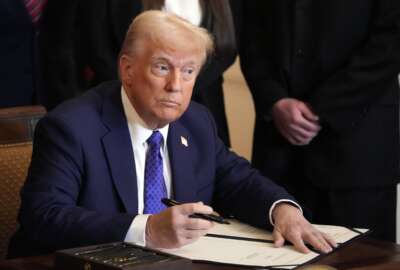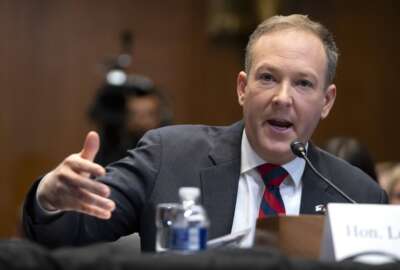More problems with VA scheduling systems revealed
The electronic wait system for keeping track of and monitoring initial primary-care appointments for new patients at Veterans Affairs medical facilities is not the...
A “complicated” scheduling system, unrealistic goals for treating veterans at VA medical facilities and manipulation of wait-times by VA staff have left as many as 57,000 veterans waiting more than 90 days for their first medical appointment, according to a new audit released by the department Monday.
The internal report comes weeks into a growing outcry about delays at VA facilities.
The audit blamed the delays, in part, on a “complicated” scheduling system that has “resulted in confusion” among schedulers and supervisors as well as a 14-day wait-time goal that VA concluded has been deployed inconsistently and is simply “not attainable.” Thirteen percent of VA scheduling staff interviewed for the report said they felt pressure from supervisors to falsify appointment dates to make wait-times appear shorter.
But the electronic wait system for keeping track and monitoring of initial primary-care appointments for new patients is not the only scheduling system at VA that’s now under scrutiny.
System for tracking clinical consultations ‘unreliable’
A separate system for monitoring VA patients’ access to outpatient specialty care — appointments with cardiologists, gastroenterologists and physical therapists, for example — is also “unreliable.” That’s according to prepared testimony from Debra Draper, director of health care issues at the Government Accountability Office, who was appearing before the House Veterans Affairs Committee Monday evening, in a hearing titled “Data Manipulation and Access to VA Health Care.”
According to a 2012 report, Veterans Health Administration officials told GAO they were unable to track systemwide data to see if patients who had been referred to experts for clinical consultation actually received care within the timelines mandated by the department.
Once a patient’s primary-care provider requests a consultation using the online system, it should be scheduled and take place within 90 days, according to VHA policy. At that time, about 2 million “consults” had been left unresolved in the system for more than 90 days and VHA “could not accurately determine whether patients actually received the care they needed, or if they received the care in a timely fashion,” according to Draper’s testimony.
As of June 2014, about 278,000 consults remain unresolved.
In the 2012 report, GAO reported requests for consultations frequently took months. In one case, a veteran referred to a physical therapist waited 252 days before he was eventually referred to a non-VA facility. Other veterans never received the requested care.
Of a sample of 150 consultation requests at five VA medical centers in 2012, 43 percent of patients never received the requested care, according to GAO.
VHA officials said a number of factors could explain the large number of unresolved cases in the system. These include patient cancellations and lax record-keeping. For example, even in cases where patients had the proper care provided in the 90-day window, GAO noted “an extended amount of time” would typically elapse before the consult system was updated with that information.
But VA medical staff also told GAO they were experiencing growing demand for procedures, such as colonoscopies and physical-therapy evaluations, and were increasingly referring veterans to non-VA providers for care to prevent delays and backlogs.
In response to the uproar over the lengthy delays experienced by veterans seeking first-time care from the VA, lawmakers have pushed the department to expand patients’ access to non-VA facilities. A bipartisan bill, introduced by Sens. John McCain (R-Ariz.) and Bernie Sanders (I-Vt.) last week, would allow patients who wait 30 days or more for VA appointments or who live at least 40 miles from a VA hospital to use private doctors who are already cleared under other government health care programs, such as Medicare and TRICARE.
Will VA be able to track wait times for non-VA care?
But the track record of private referrals for consultations has been mixed, because it can actually prove more difficult to track wait times, GAO said.
“While officials indicated that use of non-VA care can help mitigate backlogs, several officials indicated that non-VA care requires more coordination” between the medical center, the patient and the private provider, Draper testified. “In addition, wait times are generally not tracked for non-VA care. As such, officials acknowledged that this strategy does not always prevent delays in veterans receiving timely care or in completing consults.”
The department’s internal report fleshes out initial findings uncovered by the department’s inspector general, which centered on a VA medical facility in Phoenix. About 1,700 veterans seeking care there were “at risk of being forgotten or lost” in the facility’s “convoluted” scheduling process, acting IG Richard Griffin said in an interim report released late last month.
Griffin was also testifying before the House committee Monday.
“Clearly, there are national implications associated with inappropriate and non-compliant scheduling practices, including the impact on patient care and a lack of data integrity,” he said in prepared testimony. “Veterans who utilize the VA health care system deserve quality care in a timely manner. Therefore, it is necessary that information relied upon to make mission-critical management decisions regarding the demand for vital health care services must be based on reliable and complete data throughout VA’s health care networks.”
RELATED STORIES:
VA chief: 18 vets left off waiting list have died
Audit: More than 57,000 await first VA appointment
Copyright © 2025 Federal News Network. All rights reserved. This website is not intended for users located within the European Economic Area.





